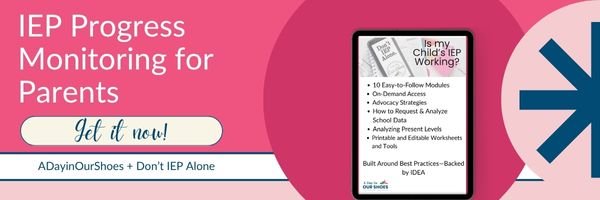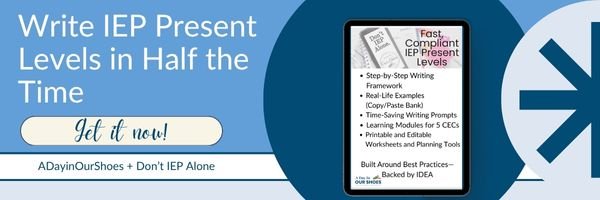-
Confused? Frustrated? Slightly unhinged? Perfect. Ask away.
-
- 6 replies
- 1,066 views
-
Question: Parents Request Modification, School Says Unnecessary
By Brittney M, in IEP Questions
- Has best answer
- 0 votes
- 3 answers
-
Psychoeducational evaluation for student with good grades
By Boy Mama, in IEPs and 504s
- good grades
- mental health
- (and 4 more)
- 5 replies
- 1,452 views
-
Question: IEP services access
By Tamar, in IEP Questions
- Awaiting best answer
- visiontherapy
- IEP
- (and 1 more)
- 0 votes
- 3 answers
-
- 0 votes
- 1 answer
-
- 0 votes
- 2 answers
-
-
 Hot Freebies Alert: Most-Loved IEP Tools You Can Grab Right Now
Hot Freebies Alert: Most-Loved IEP Tools You Can Grab Right Now 
- Free IEP Binder for Parents
- Free IEP Data Collection Sheets (for School Staff)
- Free IEP Goal Tracker (for parents)
- NEW: Free IEP Guide for Paras
- New: Free IEP Present Levels Planning Guide
- New: Free IEP Goal Tracking Spreadsheet
-
Member Statistics
-
Tell a friend
-
Recent Activity in the Village
-
6
9th grader receiving derogatory comments daily
Your child is disabled and this discrimination-you can file with OCR. I would use the words "discrimination" & "harassment" when writing to the district. The school already knows about the bullying as you have brought it up in meetings. Document every time it happens. Bullying Prevention | Department of Education | Commonwealth of Pennsylvania -
6
9th grader receiving derogatory comments daily
Local Task Force contacts are listed online: https://www.pattan.net/CMSPages/GetAmazonFile.aspx?path=~\pattan\media\stfdocs\ltf-2024-2025-contact-information-10_17_1.pdf&hash=c9bc2458dc739f5b4b7329280963e5057e5a1e0d66932630159a3455446597b7- 1
-

-
3
IEP services access
The School Can Choose the "Where" (34 C.F.R. § 300.116) They Must Offer Transportation (34 C.F.R. § 300.34(c)(16))Also, You Cannot Be Forced to Drive. Because of the “at no cost” rule, there is usually a reimbursement option for the drive if you were to drive Another thought: you might be able to negotiate the closer location by showing them that it’s actually cheaper for the district to pay the local provider's fee than to pay for the distant service plus the mandatory transportation costs. Another argument could be that the school's choice of Location is effectively denying your child FAPE because the travel time required to get there is too restrictive.- visiontherapy
- IEP
- (and 1 more)
-
6
9th grader receiving derogatory comments daily
Can you contact your Local Task Force for your county? Check with your IU and they will give you the contact info. The Right to Education Local Task Forces are there to help with resources but also to address systemic issues in school districts (on a positive note, the LFT's are parent led). You can also call in the Safe to Say hotline, it's not just for students. Are the parents involved parents? IDK where in Pa you are but there are a few free advocacy groups.- 1
-

-
6
9th grader receiving derogatory comments daily
PA has Safe2Say. It was put in place to report things like overhearing a classmate say they want to end it all but it definitely gets used to report bullying. They have an app & a website for anonymous reporting. Has social skills & pragmatics been evaluated? These are the areas of need I've seen in kids like yours. It's also areas I've seen schools miss. Will not be covered by an IEE if the school hasn't already done an eval. They might not be able to "help what kids say" but they also need to have no bullying policies in place that get enforced. I'm guessing that the more your child is harassed, bullied & teased, the worse the stutter gets. Is your son getting outside therapy? An outside therapist can sometimes get the school to see how toxic the school environment is. In PA, your child qualifies for Medicaid and that can cover outside speech therapy which might work better than school therapy. It covers social skills too but it can be hard to find places that offer this & take Medicaid. The application is online. https://www.pa.gov/agencies/dhs/programs-services/apply-for-benefits -
6
9th grader receiving derogatory comments daily
:)!!! I am definitely not in “California” anymore!!! IEEs are scheduled, I was able to find and hire a great advocate, so I’m working on finishing all the data that supports that the goals, interventions, and placement need to be changed. In the meantime, my kiddo is very distressed daily about school:(. As far as anonymous reporting (they have it), how does this work? If I report the names of kids who are doing this, I think it would be obvious who was reporting and get back to my kiddo (who is mortified and was called a snitch in earlier grades). Will anonymous reporting be useful as a record of what is happening for us? Coping skills were in previous IEPs and not helpful. They were proposed in October in a manner that sounded punitive (relationship with district is strained). Also, after discussing the “stuttering autistic freak” remark at an IEP meeting, district proposing creating a coping skills goal did not sit well; as in kiddo must learn how to cope with being called this. He needs social skills, their online program is not helping him. He needs speech (as the insult implies) but they pull out their trusty “not according to the ER”. At the same meeting they said they can’t help what kids say. I explained hostile environment to them which they followed up with an email about their best buddies program. It is a hostile environment for my kiddo:(. Any pros and cons would be appreciated.
-




.jpg.bf032d4761e352957765b7d1c07acdb7.jpg)
.jpg.e58551ed05df8e01beb471ff6f874a52.jpg)
 Drop your IEP drama here.
Drop your IEP drama here. .cropped.png.b0b6ebc1971f82c23f5fa33cfbda69c4.png)



.png.b5e0059fea9b5ede61f324f5709bbeca.png)